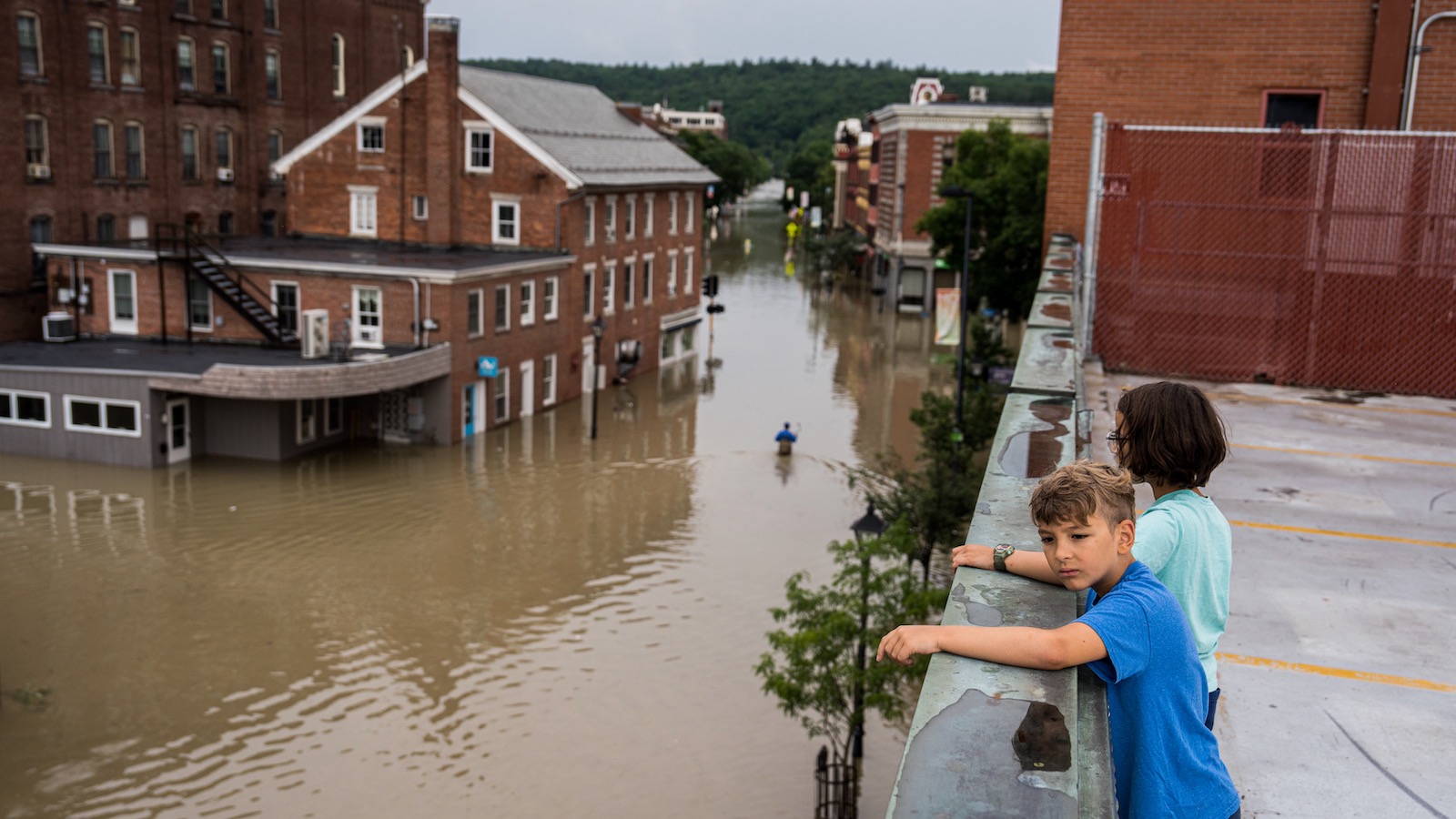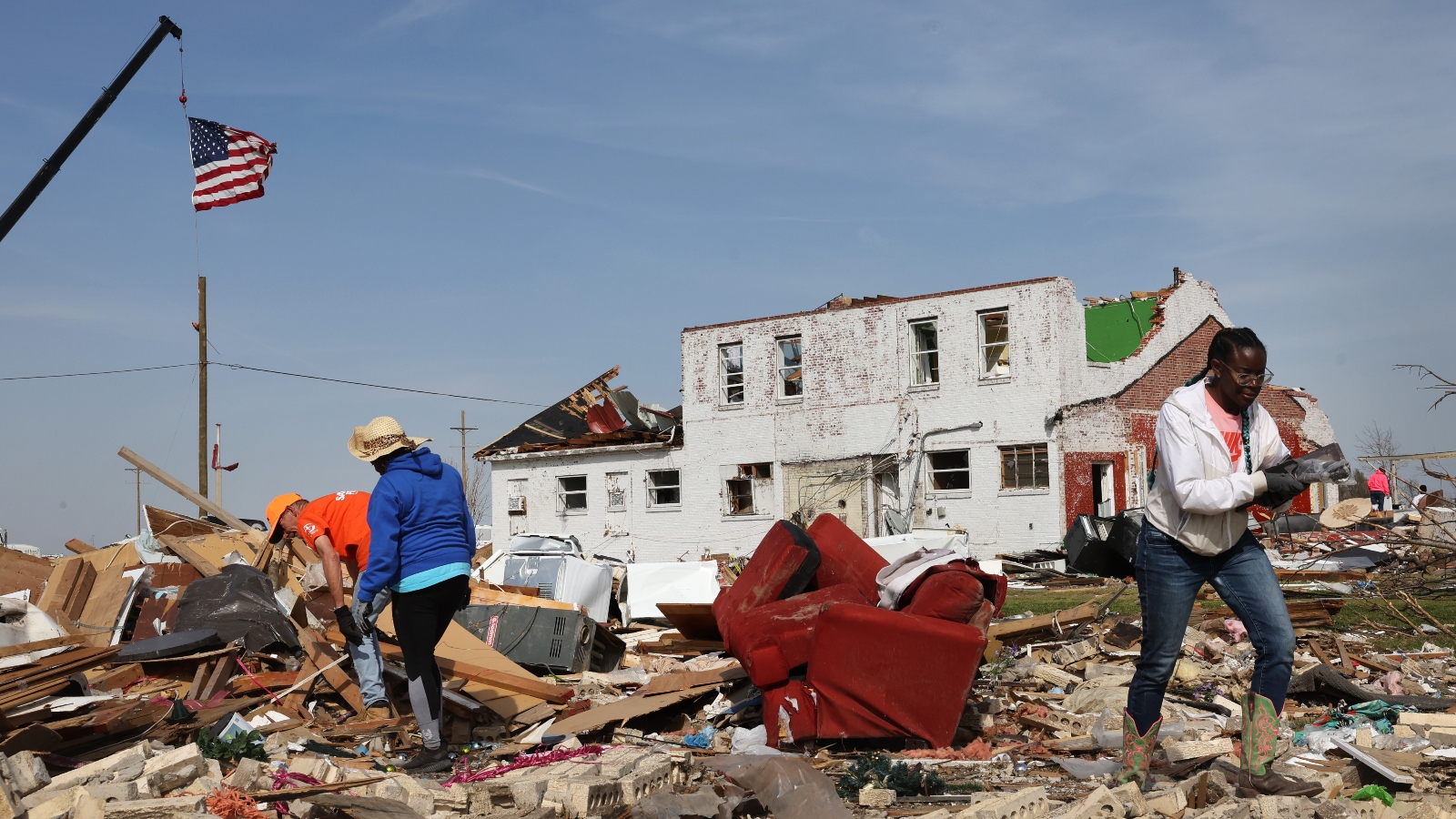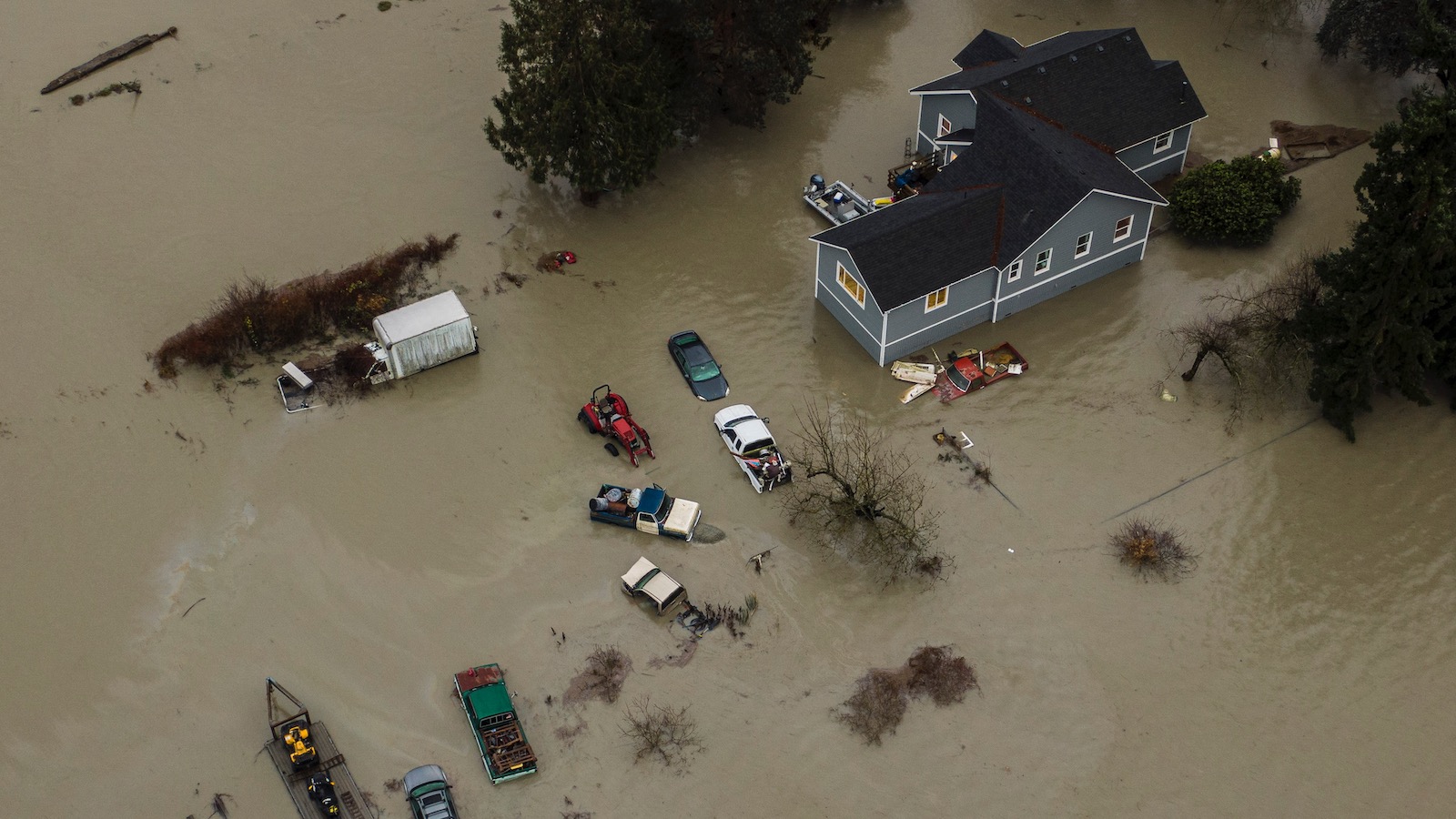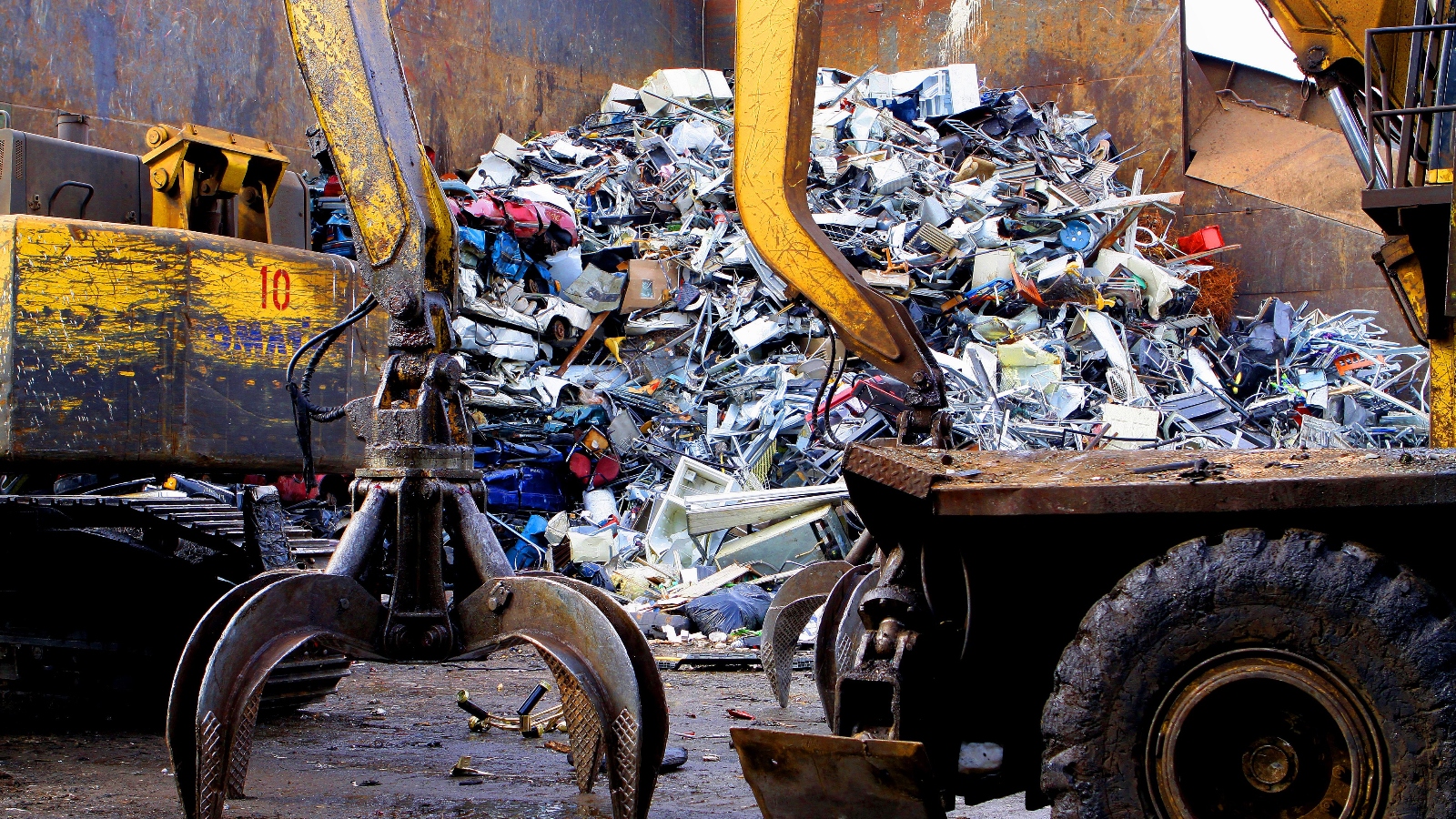A Superfund for climate change? States consider a new way to make Big Oil pay.
Vermont joins three others in trying to make the fossil fuel industry finance climate action.

Last July, the normally warm and humid but still pleasant New England summer was disrupted by a series of unusually heavy rain storms. Flash floods broke creek banks and washed away roads, inundating several cities and towns. Vermont and upstate New York in particular saw immense damage. As communities attempted to recover from the havoc, legislators in these states, and several others, asked themselves why taxpayers should have to cover the cost of rebuilding after climate disasters when the fossil fuel industry is at fault.
Vermont is now joining Maryland, Massachusetts, and New York in a multi-state effort to hold Big Oil accountable for the expensive damage wrought by climate change. Bills on the docket in all four states demand that oil companies pay states millions for such impacts by funding, as Vermont’s proposal outlines, energy efficiency retrofits, water utility improvements, solar microgrids, and stormwater drainage, just to name a few resiliency programs.
“There will be no shortage of climate expenses that it would be entirely appropriate for this fund to pay for,” said Ben Edgerly-Walsh, the climate and energy director for the Vermont Public Interest Research Group. “These are not going to be avoidable expenses at the end of the day because of the way the climate crisis is playing out.”
One 2023 poll showed that over 60 percent of voters nationwide support making polluters pay for the consequences of their actions. Should these bills become law, however, they surely face a long road of legal battles before they are implemented. The American Petroleum Institute, which represents some 600 fossil fuel companies, did not respond to a request for comment.
Still, such efforts have a number of precedents. The most obvious is the 1998 settlement that forced Big Tobacco to provide $206 billion over 25 years to underwrite state public health budgets. Another example is the federal Superfund legislation enacted in 1980 that followed a number of toxic spills that drew national attention to hazardous waste dumps. After intensive advocacy by environmental organizations and frontline communities, Congress passed the Comprehensive Environmental Response, Compensation, and Liability Act, or CERCLA, which forced those responsible for these messes to clean them up or pay the government to do so.
Vermont and other states hope to replicate that model, said state treasurer Mike Pieciak. The Climate Superfund Cost Recovery Program “would basically be an assessment,” on larger oil companies, he said.
Democratic Senators Chris Van Holland of Maryland and Bernie Sanders of Vermont attempted to introduce something like CERCLA for climate change as a part of the federal Build Back Better Act. That didn’t work out, so states picked up the baton. In Vermont, the campaign began just before June’s record flooding. Walsh believes that timing helped garner political support for the effort. The bill is backed by a supermajority in the state Senate and a majority in the House. It’ll soon be sent to committee for further consideration, and could be sent to the governor in April or May.
A 2021 report estimated that the cost of flood damages to homes, public infrastructure, and businesses throughout parts of Vermont could cost the state $5.2 billion during this century. An analysis by the Vermont Atlas of Disaster showed the Green Mountain State ranks fifth per capita in climate spending.
The small state, home to just over 645,000 people, has repeatedly slung stones at oil industry leviathans. It is suing ExxonMobil under its consumer protection law, alleging that the company, which has for decades understood burning fossil fuels causes climate change, knowingly misled the state’s consumers on the risks of its products.
Communities in other states, too, have explored ways to hold fossil fuel accountable for damages, sometimes much more directly. Public health researchers in Kentucky linked deaths in the state’s horrific 2022 floods — which killed more than 40 people — to excessive strip mining that flattened mountaintops and destroyed streams. Beverly May, a retired project manager in the University of Kentucky’s department of public health and epidemiology, tried to send these results to the federal Office of Surface Mining; she never heard back. May also pointed to early attempts by anti-strip mining activists to ensure that taxes paid by coal companies go into a trust fund to ensure cleanup and remediation continues long after the companies move on. Those efforts cratered for lack of political will. “You might as well have opened the window and shouted, ‘Hey, nonny nonny,’ for all the help we got,” May said with a sigh. “In towns all over southwestern Virginia and eastern Kentucky, governments are collapsing because there’s no money they can spend.”
Legislation of the sort being pursued by Vermont and others won’t repair all of the damage wrought by climate change or stop pollution on its own, but such laws could provide remediation funding for communities that don’t have much money to go around. Pat Parentau, a professor emeritus of climate policy at Vermont Law and Graduate School, served on the New England regional council for Superfund when that pioneering legislation was implemented. With his home state now attempting to pass climate legislation modeled after it, he sees both reasons for optimism and instructive lessons.
“It’s one more pressure point to accelerate the transition that is underway,” Parentau said.
But enforcing such measures won’t be easy, even if the bill does pass. Larger states might be able to fight for themselves; Vermont is using a no fault scheme, which means the state wouldn’t have to prove negligence to make companies pay into the Climate Superfund Cost Recovery Program. Any company engaged in the oil business could be held responsible. The liability is strict: companies at every step of the process, from the drilling and production to the distribution and transportation of fossil fuels, would have to pay up, though companies at the extraction end of things would be prioritized. Parentau pointed out that that could be a weakness of the bill, making it difficult to enforce. And where Superfund created a model to assess responsibility through convening a meeting of all parties involved, that task may be more nebulous when addressing carbon emissions.
“Once you pass it, you’re in it for the long slog,” said Parentau. “I question whether they have the legal resources to go up against the ExxonMobils of the world.”
Ideally, something like this would become federal law, but Parentau says that’s doubtful at this point with the major piece of climate legislation being “mostly carrots.”
It’s hard to hold massive multinational corporations accountable to vulnerable communities, and hard to get the money to the right places once it comes. The Big Tobacco settlement was supposed to bring a public health windfall to cash-strapped counties, but in reality, much of the funding was diverted to other priorities, like roadbuilding, and served more as glue to hold local budgets together than as a source of revenue for health programs. Meanwhile, Parentau said, communities spent ten years litigating the Superfund program, and despite progress, a massive number of sites remain to be cleaned up even decades later. Carbon pollution may prove even more elusive — since it’s atmospheric, it’s diffuse through the air and not concentrated anywhere.
Walsh, though, believes that the potential battles ahead are worthwhile; they set an example. “It’s a fight worth having, because it’s so high stakes,” he said.
*Correction: This story originally misstated the month the flooding in Vermont occurred and did not include Ben Edgerly-Walsh’s full name.
This story was originally published by Grist with the headline A Superfund for climate change? States consider a new way to make Big Oil pay. on Feb 2, 2024.
What's Your Reaction?
























































